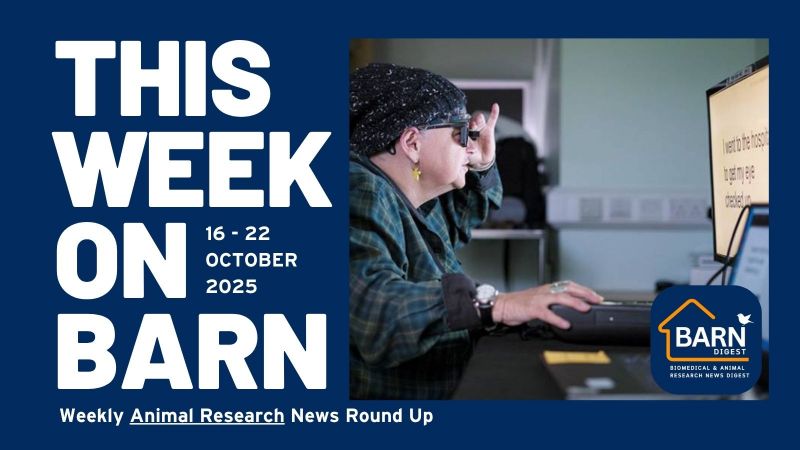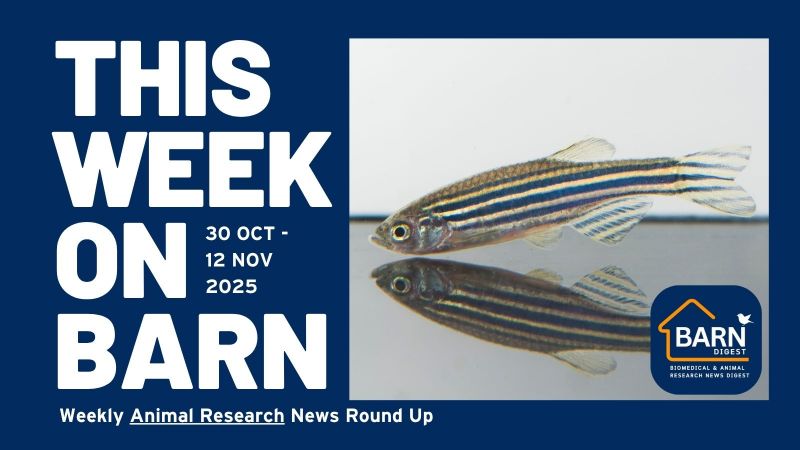
The Biomedical Animal Research News (BARN) Digest collates animal research news from UAR’s 150+ member organisations into one, easy to access, feed. These animal research related stories include topics such as: medical studies and advancements; animal welfare and 3Rs news; funding, regulatory, and policy news; and conservation and environmental research that involves animal testing.
Each week, we pick the most interesting, groundbreaking, and important news to feature in a weekly news roundup. We were unable to publish a round up last week, so this week we are featuring news stories from 13 November - 26 November 2025.
View BARN to see daily news updates from UAR members.
CLINICAL RESEARCH
New hope for children with devastating rare genetic disorder, thanks to world-first research in Manchester
UNIVERSITY OF MANCHESTER | MICE
Gene therapy for Hunter's syndrome was developed using mice.
"The parents of a three-year-old boy born with a devastating, life-limiting genetic condition say they are now excited for his future after he received a revolutionary stem cell gene therapy treatment developed by researchers at the University of Manchester.
The clinical study at RMCH is investigating a one-off gene therapy which involves removing the child’s stem cells, replacing the faulty gene and re-injecting the modified cells into the patient. These stem cells can produce high levels of the missing enzyme and also reach the brain.
Hunter syndrome can be life-threatening, with life expectancy typically between 10 and 20 years. Currently the only licensed drug that can help to improve life for children with Hunter syndrome is Elaprase – a weekly enzyme replacement therapy that takes approximately three hours, that children must take for their whole life. Approximately 50 patients in the UK receive Elaprase, which costs around £375,000 a year per patient. The drug can reduce mobility and organ problems but cannot improve mental decline.
Now, several months on from the procedure, Ollie has fully recovered from the transplant, and his parents and the Manchester researchers are excited by his progress."
Boy given world-first gene therapy made by UCL scientists ‘thriving’
UCL | MICE
Gene therapy for Hunter's syndrome was developed using mice.
"A young boy born with a devastating, rare genetic condition has been given a new lease of life thanks to a team of UCL scientists who manufactured a pioneering gene therapy for him.
Dr Karen Buckland (UCL Great Ormond Street Institute of Child Heath) said:
“It’s really heart-warming to hear how well Ollie is doing – his progress is amazing. It’s also really, really rewarding for the team here. A lot of hard work has gone into manufacturing this new gene therapy. As well as the core team of five, around 50 staff were involved in total including all the clinical trial co-ordinators, project managers and quality assurance staff."
“It took two years just to check that the manufacturing process worked correctly. We then had to get regulatory approval before we could even begin treating Ollie’s cells.”"
https://www.ucl.ac.uk/news/2025/nov/boy-given-world-first-gene-therapy-made-ucl-scientists-thriving
Deep brain stimulation successful for one in two patients with treatment-resistant severe depression and anxiety
UNIVERSITY OF CAMBRIDGE | DEVELOPED USING ANIMALS
Deep brain stimulation has been tested extensively in animal models including rodents, pigs, and monkeys.
"Deep brain stimulation – implants in the brain that act as a kind of ‘pacemaker’ – has led to clinical improvements in half of the participants with treatment-resistant severe depression in an ‘open label’ trial.
Significantly, the study, led by researchers in the UK and China, identified a telltale signature of brain activity that predicted how well individual patients responded to the treatment. This could be used in future to target the treatment at those patients most likely to benefit."
New research confirms HPV vaccination prevents cervical cancer
UNIVERSITY OF EXETER | DEVELOPED USING ANIMALS
The discovery of the human papillomavirus (HPV), the link between HPV and cancer, and the development of the HPV vaccine all relied on animal testing.
"Two new Cochrane reviews show strong and consistent evidence that HPV vaccines are effective in preventing cervical cancer and pre-cancerous changes, especially when given to young people before they are exposed to the virus.
Girls vaccinated before the age of 16 were found to be 80% less likely to develop cervical cancer. The reviews also confirm that HPV vaccines are only likely to cause minor, transient side effects such as a sore arm. The reviews were supported by the National Institute for Health and Care Research (NIHR).
Human papillomavirus (HPV) is a family of common viruses, including the viruses that cause skin warts. Whilst many types of HPV are harmless, other ‘high-risk’ types can cause cancers of the cervix, anus, penis, vulva, vagina, and throat, and others cause anogenital warts. Cervical cancer is the fourth most common cancer in women worldwide and causes more than 300,000 deaths each year, mostly in low- and middle-income countries. The new reviews confirm that vaccination against HPV can prevent most of these cancers from developing."
This story was also reported by the University of Manchester: https://www.manchester.ac.uk/about/news/new-research-confirms-hpv-vaccination-prevents-cervical-cancer/
Serious pregnancy complications 'dramatically reduced' in HPV vaccinated women
UNIVERSITY OF ABERDEEN | DEVELOPED USING ANIMALS
The discovery of the human papillomavirus (HPV), the link between HPV and cancer, and the development of the HPV vaccine all relied on animal testing.
"Pregnant women who were vaccinated against Human Papillomavirus (HPV) at school are less likely to experience serious pregnancy related complications according to University of Aberdeen research.
Incidences of pre-eclampsia, pre-term prelabour rupture of membranes (waters breaking early) and antepartum haemorrhage (bleeding after 24 weeks) were significantly reduced in women who had been vaccinated against the virus."
https://www.abdn.ac.uk/news/24848/
BASIC/DISCOVERY RESEARCH
Stroke scientists gather more evidence for presence of ‘gut-brain axis’
UNIVERSITY OF MANCHESTER | MICE
"Research on mice by scientists at The University of Manchester has shed new light on why the guts’ immune system changes after a stroke and how it might contribute to gastro-intestinal problems.
Previous studies from scientists who co-authored the current study have shown how signals from the nervous system may act to change gut immune responses following stroke.
The latest study, funded by the Wellcome Trust, shows the axis may also work in both directions, with antibody-producing immune cells moving to the brain and the associated membranes during stroke – although the importance of this for stroke severity and prognosis is not yet known.
Using mice, the team studied the changes that happened in the small intestine after a stroke, revealing populations of immune cells that make antibodies became altered in the first few days. In particular they found that a specialised subset of cells that make an antibody called Immunoglobulin A (IgA) became hyper-activated. IgA acts to manage the populations of commensal bacteria that live in the intestine and determine gut health. The researchers then found that mice lacking IgA do not exhibit the same degree of changes to the gut microbiome following stroke – suggesting altered immune function could in part explain some changes seen in the intestinal tract of stroke patients."
Study unravels puzzle of how viruses can cause long-term lung damage
UNIVERSITY OF MANCHESTER | MICE
"University of Manchester biologists have for the first time started to unpick the long-term biological changes associated with serious viral lung infections, such as flu and long-covid, in a study of mice.
Previously, little was known about the drivers of post-infection symptoms typically associated with severe viral infections, such as breathlessness and fatigue, but the study sheds light on what exactly might underpin these long-term effects.
The researchers found that following severe viral infection, a critical structure in the lung remains damaged, even after the symptoms and virus have both cleared. The structure, known as the basement membrane, is a thin supportive layer of extracellular matrix that anchors and separates cells from underlying tissue The basement membrane forms a barrier to line airspaces, support cells, and regulate fluid and cell movement.
For the study, the lungs of mice with influenza virus were analysed by proteomic mass spectrometry, to identify potential protein biomarkers compared to non-infected mice. The study also used peptide location fingerprinting, a technique developed by Dr Eckersley’s lab, which can identify damage across protein structures.
They found that basement membrane proteins had reduced abundance and harboured structural damage following recovery from infection. That suggests post-viral damage is long-term, and that the membrane does not repair appropriately. The damage appeared patchy when observed histologically and resulted in leaky lungs."
Time-sensitive genetic switch for sex-specific features of developing neurons
KING'S COLLEGE LONDON | FRUIT FLIES
"Researchers have identified that the precisely timed transcription of two genes named grim and reaper is responsible for the targeted death of neurons within the developing nervous system of female flies. This group of neurons normally survive in males and play a key role in the neural circuits underlying courtship song.
“This work is one of the most exciting things to come out of our lab. The conceptual framework it forwards and its implications are startling. The work gives us an in-road into the logic of how lineages of neurons can be finely tuned during development and in evolution,” commented Dr Darren Williams, the senior author on the study. “Until now this specific type of cell death has been largely ignored, even though it removes more than half of the neurons that are born in flies.” "
‘Worms in space’ experiment aims to investigate the biological effects of spaceflight
UNIVERSITY OF LEICESTER | WORMS
"A crew of tiny worms will be heading on a mission to the International Space Station in 2026 that will help scientists understand how humans can travel through space safely, using a Leicester-built space pod.
A team of scientists and engineers at Space Park Leicester, the University of Leicester’s pioneering £100 million science and innovation park, have designed and built a miniature space laboratory called a Petri Pod, based around the principle of the biological culture petri dish invented in 1887 and based upon earlier development work by the University of Exeter and Leicester, that will allow scientists on Earth to study biological organisms in space."
https://le.ac.uk/news/2025/november/worms-space-experiment-biological-effects-spaceflight
ENVIRONMENTAL/CONSERVATION RESEARCH
Researchers find microplastics in 100 per cent of donkey faecal samples tested
UNIVERSITY OF PORTSMOUTH | DONKEYS
"A study by the University of Portsmouth has revealed for the first time the extent of the devastating impact of plastic pollution on livestock, humans and the wider environment on the Kenyan island of Lamu.
Researchers took a multi-disciplinary approach, quantifying the amount of microplastics in donkey and cattle faeces, observing their natural feeding behaviour and surveying residents and visitors to understand their attitudes towards plastic pollution and donkey welfare.
Alarmingly, they found microplastics in 100 per cent of donkey (and cattle) faecal samples analysed. Vets at The Donkey Sanctuary’s clinic in Lamu have long been calling for action due to the volume of donkey fatalities they see each year caused by plastic-induced colic, however this is the first published evidence of its complete and widespread impact."
AWARDS
Pioneering UCL Huntington’s researcher wins major neuroscience award
UCL | AWARDS
Professor Sarah Tabrizi's research into Huntington's has involved animal models.
"Professor Sarah Tabrizi, Director of the UCL Huntington’s Disease Centre, has been awarded the British Neuroscience Association (BNA) Outstanding Contribution to Neuroscience Award for 2025, the association’s top annual prize.
One of her most paradigm-shifting contributions lies in pioneering the first gene-targeting therapy for Huntington’s disease. As the global lead investigator for the landmark IONIS-HTTRx (Tominersen) trials, Professor Tabrizi led the complex first in-human studies that demonstrated, for the first time, that the toxic mutant huntingtin protein - the central genetic driver of Huntington’s disease - could be robustly and dose-dependently suppressed in the human brain.
This revolutionary proof-of-principle study validated the gene-silencing approach and instilled unprecedented hope within the Huntington’s disease community worldwide.
Most recently, Professor Tabrizi’s leadership in the early phase clinical trial of the gene therapy AMT-130 has yielded a major step forward for the field - a reported 75% slowing of disease progression over 36 months - marking a monumental step toward a possible treatment for this fatal condition."
Visit BARN for daily news updates
Last edited: 26 November 2025 14:43




